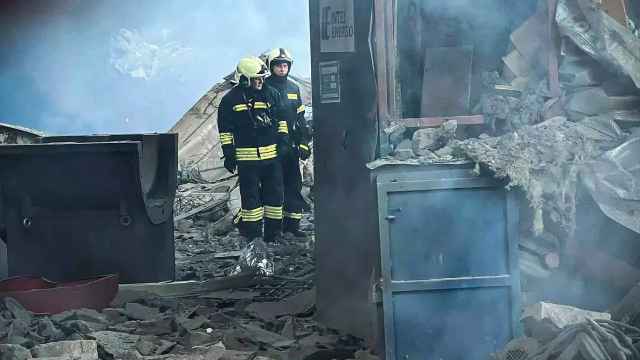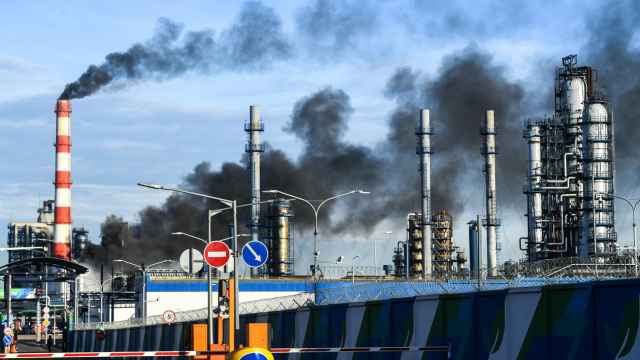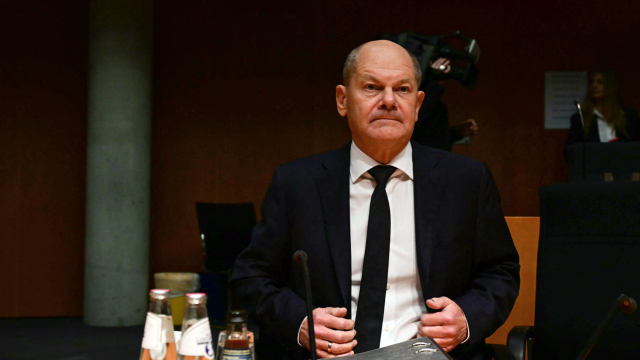The German government and media distanced themselves from former Chancellor Gerhard Schröder after pictures published Monday showed him embracing President Vladimir Putin in St. Petersburg.
A spokesman for Schröder confirmed he was in the Russian city on Monday for a shareholders' meeting of Nord Stream AG, the Russian-German pipeline joint venture he chairs. But spokesman Albrecht Funk would not say why Schröder met Putin.
"He does not represent the German government," a senior German government official said when asked about the pictures of Schröder's meeting with Putin. "It should be clear to everyone that Mr. Schröder left active politics some time ago."
Publication of pictures of Schröder in a warm embrace with Putin comes at a time of high tension between the West and Russia. They also underscore Germany's ambivalence about new sanctions on Russia.
Germany, which relies heavily on Russia for natural gas supplies, has been trying to defuse tensions over Ukraine and seen in the West as reluctant to ratchet up sanctions against Moscow. Opinion polls show Germans oppose trade sanctions.
Schröder, chancellor from 1998 to 2005, has come under fire before for his close relations with Putin. Schröder became the board chairman of a German-Russian pipeline joint venture with gas monopoly Gazprom Nord Stream after leaving office.
Schröder, the former leader of Germany's center-left Social Democrat (SPD) party that shares power with Chancellor Angela Merkel's conservatives, faced heavy criticism in German media on Tuesday for the Putin meeting although some voices pointed out that they hoped Schröder could use his influence on Putin to defuse the tensions over Ukraine.
"Schröder celebrates his birthday with Putin and makes Germany's foreign policy look absurd," wrote Roland Nelles in a commentary for Der Spiegel magazine's online edition, which published a series of pictures showing Schröder first waiting for Putin's car to arrive and embracing the Russian president.
"The ex-chancellor is mistaken to think he can carry on with business-as-usual as if nothing has happened. The German government, which his party belongs to, is doing all it can right now to stop his friend Vladimir from pursuing power-hungry policies. In times like this, a former German government leader should keep his distance."
Heiner Bremer, senior political correspondent for Germany's N-TV news network, also condemned Schröder.
"It shows Schröder has no instincts and no taste for such a meeting at a time when Putin has annexed Crimea and is trying to redraw Eastern Europe's borders," Bremer said in a commentary. "He has lost all credibility."
The Frankfurter Allgemeine Zeitung online also criticized Schröder, adding his SPD party in Germany was left speechless.
"There is something ghoulish to pictures of a smiling Schröder as he hugs his friend Vladimir at the same time German army soldiers have been taken hostage by fanatic Putin admirers," wrote Thomas Holl of the FAZ in a commentary, referring to observers from the Organization for Security and Cooperation in Europe who are being held hostage in Slovyansk, Ukraine.
See also:
A Message from The Moscow Times:
Dear readers,
We are facing unprecedented challenges. Russia's Prosecutor General's Office has designated The Moscow Times as an "undesirable" organization, criminalizing our work and putting our staff at risk of prosecution. This follows our earlier unjust labeling as a "foreign agent."
These actions are direct attempts to silence independent journalism in Russia. The authorities claim our work "discredits the decisions of the Russian leadership." We see things differently: we strive to provide accurate, unbiased reporting on Russia.
We, the journalists of The Moscow Times, refuse to be silenced. But to continue our work, we need your help.
Your support, no matter how small, makes a world of difference. If you can, please support us monthly starting from just $2. It's quick to set up, and every contribution makes a significant impact.
By supporting The Moscow Times, you're defending open, independent journalism in the face of repression. Thank you for standing with us.
Remind me later.





